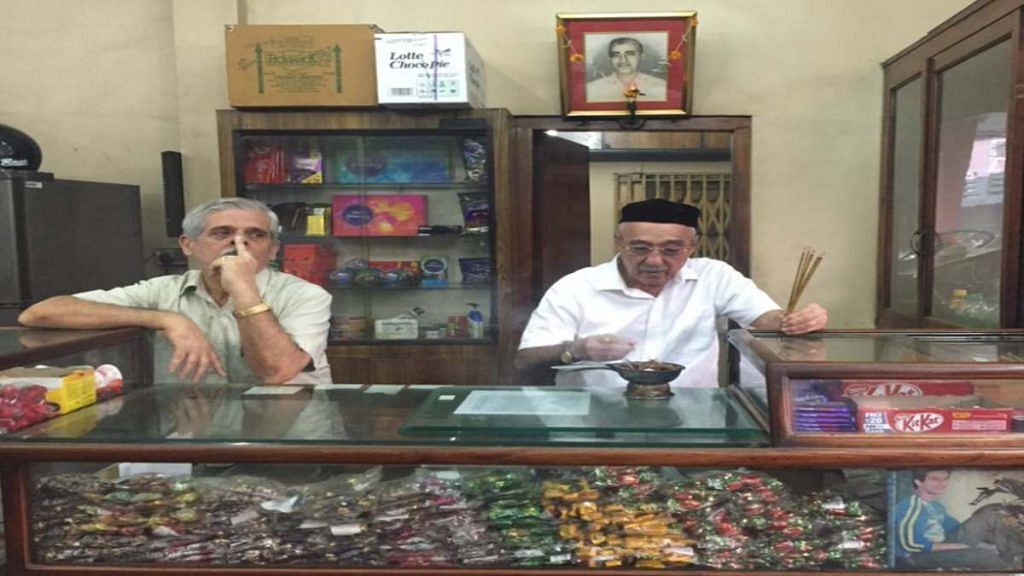Mumbai: Among the Parsi residents of Rustom Bagh in Mumbai, Darius Ferzandi, 85, was a household name. A senior partner at the popular Byculla Restaurant and Bakery, located just across the road, Ferzandi understood his customers. He knew exactly what his frequent patrons wanted, and how they wanted it.
So, when Ferzandi, a restaurateur since the early days of Independent India, passed away Thursday at the age of 85, it was a personal loss for Rustom Bagh, where generations have grown up relishing the delicious chicken “patice” (same as patties), Byculla syrup (a raspberry drink), and bun maska offered by the restaurant.
We are sorry to hear about the passing of Mr Darius Ferzandi senior partner of Byculla Restaurant & Bakery. Mr. Ferzandi sat at the gullah (counter) of the Restaurant since 1954 & would perform the loban ritual every evening. Here he is with Mr Sheriar Raisi manager of Restaurant pic.twitter.com/wYsMFzZCYi
— Bombaywalla Historical Works (@BombaywallaBlog) May 22, 2020
For Parvez Karkaria, an octogenarian resident of Rustom Bagh, Ferzandi’s death signals the end of an era.
“I started going to the restaurant in 1953 when I was 15 years old. My college was in south Mumbai, so a group of us travelled by train. The Byculla Restaurant and Bakery (also in south Mumbai) was our favourite place after college,” said Karkaria.
“Our pocket money would be about Rs 10 back then. We would sit around in the restaurant, drinking the pink-coloured Byculla syrup. If we could afford it, then we would have chicken patice too,” she added.
Also Read: Mumbai loses a diamond: Boman Kohinoor of popular restaurant Britannia passes away at 97
‘An elder brother’
Byculla Restaurant and Bakery is 105 years old. It was started by Ferzandi’s father, a Parsi who travelled from Iran and settled in what was then Bombay. Ferzandi joined the restaurant when he was 18 years old.
Like the whole of her generation, Karkaria came from a Parsi family that was orthodox in many ways. Every minute had to be accounted for. However, when she told her parents that the afternoon was spent with friends at the Byculla Restaurant and Bakery, their stern gaze softened and the angry words died on their lips, she said.
“Such was the respect they had for Darius. Our parents would not scold us for going there. He was like an elder brother to all of us,” she added.
In respecting Ferzandi, Karkaria’s family wasn’t alone. Around Rustom Bagh, families respected and loved him, and never thought twice when their children stepped out alone to visit the Byculla Restaurant and Bakery.
The bakery culture was brought to Mumbai by the Parsis. Until the late 1990s, the Irani cafes thrived on their cuisine, the Irani chai, the bun maska, etc. However, as the mall culture crept into Mumbai, the old-world charm of Bombay started fading, and the Irani cafes began to close down.
The Byculla Restaurant and Bakery, like its peers, struggled to keep up operations with their low-priced menu. Despite attrition, however, many of Ferzandi’s employees have been with him for over 45 years.
“Darius kept the prices low but delivered high-quality food. Despite the competition around him, the quality of food was never compromised,” said Vikram Balsara, a Colaba resident who visits the restaurant every weekend.
Others agree. Many patrons contacted by ThePrint for this report said they had never tasted better sliced bread, sali (a Parsi dish) or vegetable patice than the ones served by Ferzandi.
“He used to have a thriving business. Despite the escalating costs in the later years, the prices at the Byculla Restaurant and Bakery continued to remain low,” said a Rustom Bagh resident who preferred not to be named.
“Darius was not bothered about money. He had a golden heart. Whatever money we gave him he put it in the gallah.”
The Covid-19 lockdown means patrons of the restaurant have not been able to visit it for the milky, sweetened Irani chai they so love, a frequent jaunt that almost qualifies as a tradition in many local households.
They will surely return when the restaurant reopens, but Ferzandi’s absence at the gallah (counter) — his pride of place for the past 67 years — will be a bitter truth to swallow.
“For me and my husband, the sliced bread will never taste the same again,” said Karkaria.
It is yet unclear who will take over the reins of the restaurant in Ferzandi’s absence.
Also Read: A decade-long legal battle for permission to attend Parsi parents’ last rites
